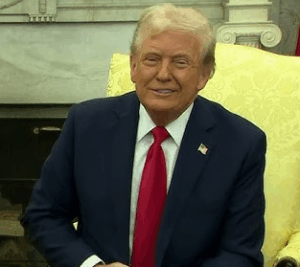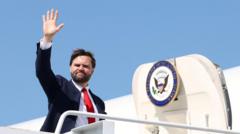European officials express apprehension about Trump’s approach to negotiations, fearing it may undermine Ukraine's security
Trump Administration's Foreign Policy Critiqued by European Diplomats at Munich Security Conference

Trump Administration's Foreign Policy Critiqued by European Diplomats at Munich Security Conference
Concerns arise over perceived appeasement of Putin regarding Ukraine conflict strategy
As the Munich Security Conference unfolded, apprehensions emerged among European diplomats regarding the Trump administration's handling of Russia in the ongoing conflict in Ukraine. Kaja Kallas, the European Union's leading foreign policy figure, voiced strong criticism, labeling the administration's strategy as "appeasement" and drawing attention to the historical failures associated with that approach.
Kallas, a former prime minister of Estonia, emphasized serious concerns about President Trump’s readiness to concede significant demands by Russian President Vladimir Putin before negotiations have even commenced. This sentiment echoed throughout the conference, as delegates grappled with Trump's ambiguous intentions regarding a peace deal that might sideline both Ukrainian interests and European support.
During the event, confusion reigned following contradictory statements from U.S. leaders. Secretary of Defense Pete Hegseth and Vice President JD Vance, both articulating their positions for the first time on the international stage, seemed to send mixed signals about the U.S. stance on Ukraine's sovereignty and security guarantees. The lack of a coherent strategy was evident, leaving European officials perplexed and concerned.
Furthermore, discussions aimed at discerning how to prevent Putin from rearming his military during a potential cease-fire failed to yield clarity, exacerbating anxieties about the future of Ukraine. With the stakes high and prospects uncertain, European diplomats left Munich more worried than reassured about the Trump administration's commitment to maintaining regional stability and protecting Ukrainian sovereignty.
Kallas, a former prime minister of Estonia, emphasized serious concerns about President Trump’s readiness to concede significant demands by Russian President Vladimir Putin before negotiations have even commenced. This sentiment echoed throughout the conference, as delegates grappled with Trump's ambiguous intentions regarding a peace deal that might sideline both Ukrainian interests and European support.
During the event, confusion reigned following contradictory statements from U.S. leaders. Secretary of Defense Pete Hegseth and Vice President JD Vance, both articulating their positions for the first time on the international stage, seemed to send mixed signals about the U.S. stance on Ukraine's sovereignty and security guarantees. The lack of a coherent strategy was evident, leaving European officials perplexed and concerned.
Furthermore, discussions aimed at discerning how to prevent Putin from rearming his military during a potential cease-fire failed to yield clarity, exacerbating anxieties about the future of Ukraine. With the stakes high and prospects uncertain, European diplomats left Munich more worried than reassured about the Trump administration's commitment to maintaining regional stability and protecting Ukrainian sovereignty.






















